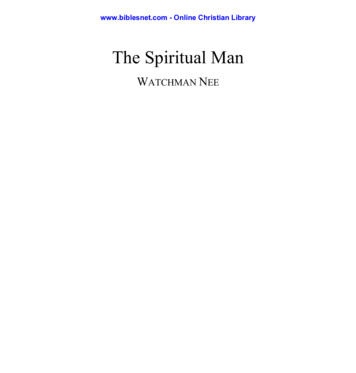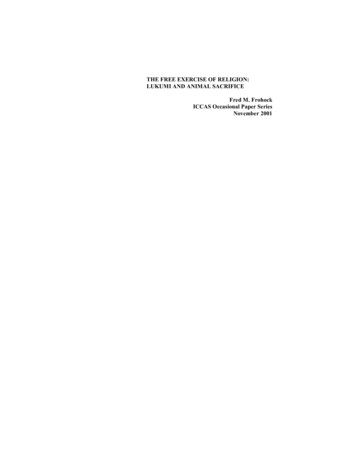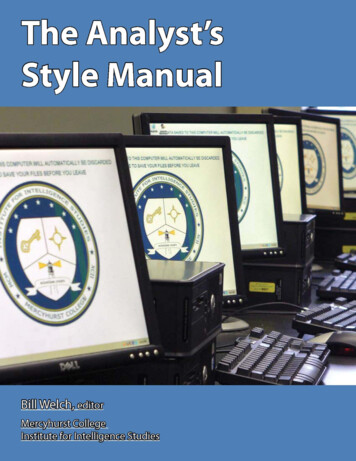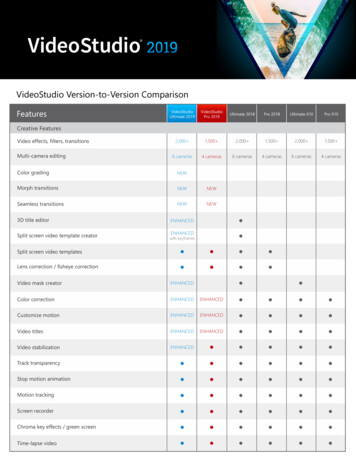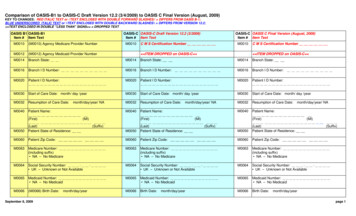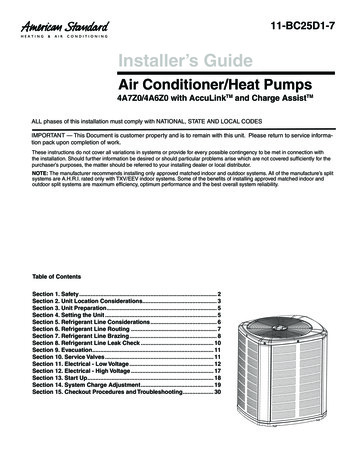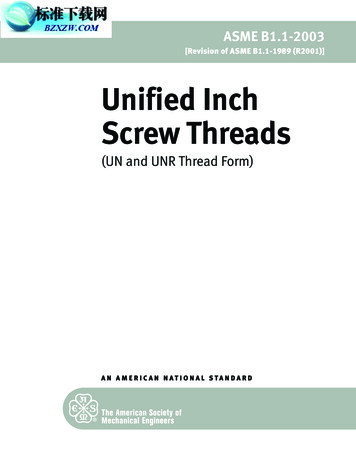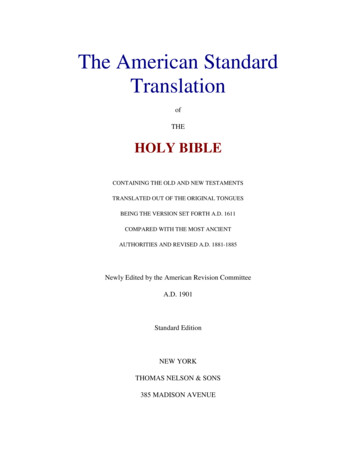
Transcription
The American StandardTranslationofTHEHOLY BIBLECONTAINING THE OLD AND NEW TESTAMENTSTRANSLATED OUT OF THE ORIGINAL TONGUESBEING THE VERSION SET FORTH A.D. 1611COMPARED WITH THE MOST ANCIENTAUTHORITIES AND REVISED A.D. 1881-1885Newly Edited by the American Revision CommitteeA.D. 1901Standard EditionNEW YORKTHOMAS NELSON & SONS385 MADISON AVENUE
This Standard American Edition of the Revised Version of the Bible, and editions in conformitywith it published by Messrs. THOMAS NELSON & SONS and certified by this indorsement, arethe only editions authorized by the American Committee of Revision.GEORGE E. DAY, Secretary of the Committee, and of the Old Testament Committee.J. HENRY THAYER, Secretary of the New Testament Company.From the American Standard Edition of the Revised BibleCOPYRIGHT, 1901,BY INTERNATIONAL COUNCIL OF RELIGIOUS EDUCATIONTO INSURE PURITY OF TEXTPrinted in the United States of AmericaPREFACEA FEW statements need to be made respecting the origin of this edition of the Revised Version ofthe English BibleIn the course of the joint labors of the English and American Revisers it was agreed that respectingall points of ultimate difference, the English Companies, who had had the initiative in the work ofrevision, should have the decisive vote. But as an offset to this, it was proposed on the British sidethat the American preferences should be published as an Appendix in every copy of the RevisedBible during a term of fourteen years. The American Committee on their part pledged themselvesto give, for the same limited period, no sanction to the publication of any other editions of theRevised Version than those issued by the University Presses of England.There still remained the possibility that the British Revisers, or the university Presses, mighteventually adopt in the English editions many, or most, of the American preferences, in case theseshould receive the approval of scholars and the general public. But soon after the close of theirwork in 1885 the English Revision Companies disbanded; and there has been no indication of anintention on the part of the Presses to amalgamate the readings of the Appendix, either wholly or inpart, with the text of the English editions.The American Revision Committee, after the publication of the Revised Version in 1885, resolvedto continue their organization, and have regarded it as a possibility that an American recension ofthe English Revision might eventually be called for. Accordingly they have been engaged more orless dilligently, ever since 1885, and especially since the year 1897, in making ready for such apublication. The judgment of scholars, both in Great Britain and in the United States, has so farapproved the American preferences that it now seems to be expedient to issue an edition of theRevised Version with those preferences embodied in the text.
If the preparation of this new edition had consisted merely in the mechanical work of transferringthe readings of the Appendix to the text, it would have been a comparatively easy task. But thework was in point of fact a much more elaborate one. The Appendix was itself in need of revision;for it had been prepared under circumstances which rendered fullness and accuracy almostimpossible. This work could of course not be taken in hand until the revision was concluded; andsince it required a careful consideration of discussions and decisions extending over a period ofmany years, there was need of many months' time if the Appendix was to be satisfactorilyconstructed, especially as it was thought desirable to reduce the number of recorded differences,and this required the drawing of a sharp line between the more and the less important. Manifestlysuch a task would be one of no little difficulty at the best. But when the time came for it to bedone, the University Presses deemed that the impatient demand of the British public for the speedpublication of the Revision must be respected; and they insisted on a prompt transmission of theAppendix. Prepared under such pressure and in such haste, it was obviously inevitable that itshould be marked by grave imperfections; and the correction of its errors and the supplementing ofits defects has been a work of much time and labor.When the Appendix was originally prepared, an effort was made to pave the way for an eventualacceptance of the American preferences on the part of the English Presses, by reducing the numberof the points of difference to the lowest limit, and thus leaving out much of the larger part of theemendations which the Revisers had previously by a two-thirds vote pronounced to be in theiropinion of decided importance. In now issuing an American edition, the American Revisers, beingentirely untrammelled by any connection with the British Revisers and Presses, have feltthemselves to be free and to go beyond the task of incorporating the Appendix in the text, and areno longer restrained from introducing into the text a large number of those suppressed emendations.The remainder of this Preface has special reference to the Old Testament. Nothing needs to be saidabout the various particular proposals which are found in the Appendix of the English RevisedVersion. But some remarks may be made concerning those emendations in this edition which areadditional to those prescribed in the Appendix.I.The change first proposed in the Appendix-that which substitutes "Jehovah" for "LORD" and"GOD" (printed in small capitals)-is one which will be unwelcome to many, because of thefrequency and familiarity of the terms displaced. But the American Revisers, after a carefulconsideration, were brought to the unanimous conviction that a Jewish superstition, whichregarded the Divine Name as too sacred to be uttered, ought no longer to dominate in theEnglish or any other version of the Old Testament, as it fortunately does not in thenumerous versions made by modern missionaries. This Memorial Name, explained in Ex3:14, 15, and emphasized as such over and over in the original text of the Old Testament,designates God as the personal God, as the covenant God, the God of revelation, theDeliverer, the Friend of his people;-not merely the abstractly "Eternal One" of many Frenchtranslations, but the ever living Helper of those who are in trouble. This personal name,with its wealth of sacred associations, is now restored to the place in the sacred text towhich it has an unquestionable claim.The uniform substitution of "Sheol" for "the grave," "the pit," and "hell," in places where theseterms have been retained by the English Revision, has little need of justification. The English
Revisers use "Sheol" twenty-nine times out of the sixty-four in which it occurs in the original. Nogood reason has been given for such a discrimination. If the new term can be fitly used at all, it isclear that it ought to be used uniformly.The use of "who" and "that" for "which," when relating to persons, should commend itself to all asrequired by grammatical accuracy. The same remark applies to the substitution of "are" for "be" inindicative clauses, the omission of "for" before the infinitive, the change of "an" to "a" before "h"aspirated. The latter change was made in the English Revision of the New Testament, but not inthat of the Old. Likewise we have uniformly adopted the modern spelling in place of antiquatedforms. No one would advocate the resumption of the exact orthography of the edition of 1611.The mere fact that in a few cases an older form has happened to be retained constitutes no reasonfor its perpetual retention.II.1.2.3.4.Inasmuch as the present edition differs from the English Revision not simply in presentingin the text the American preferences as given in the Appendix, a few remarks may be madewith regard to the additional variations which will be found to exist.As has already been intimated, this edition embodies a very considerable number of renderingsoriginally adopted by the American Old Testament Company at their second revision (and so bya two-thirds majority), but waived when the Appendix was prepared. These represent thedeliberate preference of the American Company; but for reasons already assigned, they werenot included in the Appendix.Partly coinciding with the foregoing is a number of alterations which consist in a return to thereadings of the Authorized Version. While in some cases the older readings, though inaccurate,seem to have been retained in the English Revisions through an excessive conservatism, inothers they have been abandoned needlessly, and sometimes to the injury of the sense and thesound. In such cases fidelity to the general principle that has governed us has required us togive the preference to the rendering of the Common Version. Among the many instances ofthese restorations we may note: Exod. 20:4, 13; Lev. 16:22; Psa. 68:1, Ps 104:26, Ps 114:4, Ps116:11, Prov. 8:15; Amos 6:5.Sometimes we have found occasion to recede from proposals originally made when a morecareful and mature consideration required us to do so. Besides individual cases like Psalm128:8; Ezekiel 5:13, may be mentioned the fact that the requirement of the Appendix, that "beashamed" should everywhere be changed to "be put to shame," has been found to needqualification. While the change seems desirable in a majority of the instances, it is by no meansso in all. We have therefore retained "ashamed" in a large number of passages; in some,however, we have preferred "confounded" as better suiting the connection.Very many of the instances in which we have gone beyond the literal requirements of theAppendix are alterations demanded by consistency. Changes were originally proposed incertain passages only, though the reason for the changes equally requires them to be made innumerous others. Thus at Psalm 33:5 and in twenty-four other places, "justice" was to be putfor "judgement." But it is manifest that in a multitude of other passages there is equal need ofthe same alteration. We have accordingly undertaken to introduce it wherever the Hebrewword plainly has this abstract sense. For the same reason we have substituted "ordinance" for"judgment" in the numerous passages, like Lev. 18:4, where the word denotes, not a judicialsentence, threatened or inflicted, but a law of action. This rendering of the Hebrew word isfound in the Authorized Version in some instances, and has been introduced by the Revised
Version in a few more; but since the English word "judgement" in common use never denotes astatute or command, it is manifestly desirable that "ordinance" should be used wherever theHebrew word has this meaning.Similarly, the English Revision in a few cases, and the Old Testament Appendix in a few more, put"despoil" for "spoil." But the same reason which holds for those few is equally good for thenumerous others in which this word occurs. The word "spoil" in the Authorized Version representsa great number of hebrew words, some of which denote "lay waste," "ruin," or "destroy," ratherthan "despoil"; and as "spoil" has nearly lost in popular use its original meaning, and is liable tooccasion misconception, we have replaced it by "despoil," "plunder," "ravage," and other terms,each as best adapted to the connection.In like manner we have carried out another alteration which was made to a limited extent by theEnglish Revisers-the distinction between the words "stranger" ("strange"), "foreigner" ("foreign"),and "sojourner." These renderings correspond fairly well to three distinct Hebrew words; there isno good reason why the correspondence should not be made uniform throughout. Likewise wehave carried out consistently the substitution of "false," "falsehood," and other terms for "vain,""vanity," where the meaning of the original requires it. Here too a beginning was made by us in theAppendix. Many other examples might be adduced.Here may be mentioned also that changes made for the sake of euphemism have been considerablyincreased. It has not been possible in every case to find an appropriate substitute for terms which inmodern times have become offensive; but when it has been possible, we have deemed it wise tomake the change. Some of the words, as, for example, "bowels,' are tolerable when used in theirliteral sense. Thus, no other word would be appropriate in 2 Sam. 20:10; but in Jer. 4:19 or Lam1:20 to retain that term would be both unpleasant and incorrect. The conception of the writer is notreally reproduced by a literal translation. The Hebrews were accustomed to attribute mental actionsor emotions to various physical organs, whereas in English such a trope is limited almost entirely to"heart" and "brain." There is nowhere any occasion for using the latter of these in the Bible;consequently it is almost unavoidable that "heart" should often be used as the Hebrew wordcommonly rendered "heart" is used very largely to denote not so much the seat of emotions, as theseat of thought. It is rendered in the Authorized Version more than twenty times by "mind," andmight well be so rendered much oftener.The word "reins" is one of those which in the Old Testament is used in a psychological relation.This word was retained by the English Revisers, and was also left without mention by theAmerican Revisers when they prepared their Appendix. But if the synonymous word "kidneys"had been used in these passages, there would be an earnest and unanimous protest. In favor of thecontinued use of "reins," therefore, one can only urge the poor reason that most readers attach to itno meaning whatever. We have consequently regarded it as only a formally substituted "heart" forit, whenever it is used in a psychological sense.In this connection it may be remarked that, while the English Revisers, yielding to the urgentrepresentations of the Americans, voted to substitute "its" for "his" or "her" when relating toimpersonal objects not personified, the substitution was so imperfectly made that we have hadoccasion to supplement the word in some two hundred cases.
Furthermore, the general intention of the American Revisers to eliminate obsolete, obscure, andmisleading terms has been more fully carried out by replacing some expressions which were leftunmentioned in the Appendix; e.g., "boiled" (Ex. 9:31), "in good liking" (Job 39:4).5.Closely connected with the foregoing are certain additional alterations which have seemed to berequired by regard for pure English idiom.We are not insensible to the justly lauded beauty and vigor of the style of the Authorized Version,nor do we forget that it has been no part of our task to modernize the diction of the Bible. But weare also aware that the rhetorical force and the antique flavor which we desire to retain do notconsist in sporadic instances of uncouth, unidiomatic, or obscure phraseology. While we mayfreely admit that the English of the Scriptures can, as a whole, hardly be improved, yet it would beextravagant to hold that it cannot be bettered in any of its details. What was once good usage isoften such no longer; and we can see no sound reason for retaining such expressions as "smellthereto" (Ex. 30:38), "forth of" (instead of "forth from"), "inquire at" (1 Kings 22:5), "a fool'svexation is heavier than them both," (Prov. 27:3), or "when . . . he be jealous over his wife" (Num.5:30). There are only a few of the many instances of phraseology which there is the best reason foramending.A change of a more general kind is the introduction of a greater degree of consistency and proprietyin the use of the auxiliaries "will" and "shall." The latter is certainly used to excess in theAuthorized Version, especially when connected with verbs denoting an action of the Divine Being;and the two are also often very inconsistently used, as may be observed in such a striking case as Ps121:3, 4.Again, the attempt to translate literally from the original has not infrequently led to Hebraismswhich had better be avoided. Many of these have indeed become, as it were, naturalized in ourlanguage, and need not be disturbed. But others must be called bad and outlandish. Thus, in Ezek20:17, we read, "mine eye spared them from destroying them," which is a very literal translation ofthe Hebrew, but very poor English. Scarecly more tolerable is the expression, "that they may be todo the service" (Num. 8:11), which also comes from over-literalness. To the same class belongsthe phrase "by the hand of," as used after such expressions as "Jehovah spake" (or, "commanded"),e.g., in Num 27:23. This is indeed the literal rendering; but the Hebrew really means simply"through" or "by means of," and is in the majority of these instances in the Authorized Versionrendered "by," but sometimes "by the hand of." Manifestly the simpler form is every waypreferable; and the change, if any is made, should be in this direction, whereas in the EnglishRevision "by" is, in nine cases out of forty-two, changed to "by the hand of." Similarly, "in theland," in Deut. 5:16 and in several other places, has been changed in the English Revision to "uponthe land"; but as "land" is here equivalent to "country," "in the land" is clearly the most appropriate.In both these groups of cases we have everywhere adopted the idiomatic English, rather than theslavishly literal, rendering.6. In introducing certain translation different from those of the English Revised Version, and alsonot directly or implicitly required by the Appendix, we have been governed by the convictionthat, in cases where accuracy and perpicuity clearly required an emendation, we were fullywarranted in resorting to it. We have been careful, in making these alterations, to consult the
best authorities, and especially the recent carefully revised versions of the German, French,Dutch, Danish, Swedish, and Norwegian Bibles. Few certainly will object to such alterations asare found in Deut 32:14, Judges 5:20, Isaiah 30:32; Isaiah 35:8, Hosea 11:2; Micah 1:6. Wehave also not hesitated to insert "the" before "Jordan" and other names of rivers. Likewise, asthe English Revisers had with good reason removed the fabulous "unicorn" from the OldTestament, so we have removed the equally fabulous "dragon," as also the "arrowsnake" of theEnglish revision (Isaiah 34:14)-an animal unknown to zoology, the term having obviously beenadopted through a too literal translation of the German word "Pfeilschlange."7. Another particular in which we have to some extent deviated from the requirements of theAppendix relates to our treatment of the references in the margin to the readings of the ancientversions. On account of the extreme difficulty of correcting the Hebrew text by means of thoseversions, we originally decided that it would be better to make no reference to them at all. Thecase is radically different from that of the New Testament, where the variant readings aremostly found in Greek manuscripts of the New Testament itself. The authorities referred to inthe Old Testament are translations from the Hebrew; and though the date of these translations ismore ancient than any extant manuscripts of the Hebrew Bible, yet there is no means ofverifying with certainty the text of these translations; and one can never get beyond plausibleconjection in attempting to correct the Hebrew text by means of them. It is one thing to admitthat the Hebrew text is probably corrupt here and there; quite another, to be sure how to rectifyit. In the English Revision there are frequent references in the margin to the ancient versions.The most of these seem to us at the best of trivial importance, and have been dropped. A fewrepresent only a different vocalization of the Hebrew. A certain number, however, have to dowith variations of some importance and such as may, with considerably probability, beconjectured to represent the original Hebrew. We have therefore retained a little more thanone-sixth of the references given in the English Revision, but have been careful to designatewhich of the ancient versions contain a specified reading, instead of making the vague, andoften inaccurate, statement that "some" or "many" ancient versions present the reading inquestion.8. In preparing the headings, we have intended, by means of brief but descriptive terms, to enablethe reader to see at a glance what the general contents of each page are. Everything that mightseem to savor of a questionably exegis has been carefully avoided.9. Considerable attention has been paid to the paragraph divisions and to the punctuation. Whilethe English Revisers did well to abandon the older way of making a paragraph of each verse,they often went to the opposite extreme of making the paragraphs excessively long, leaving insome cases whole pages without a break, as, for example, at Gen. 24 and Numbers 22-24. Wehave a revised the paragraph divisions throughout, making them generally shorter, andsometimes altering the place of the division.In the matter of punctuation, we have aimed to remove many inconsistencies found in previouseditions, and also, while retaining the general system adopted by our predecessors, to make thebook conform somewhat more nearly to modern usage. One result is a considerable reduction ofthe number of colons, which are often replaced by semicolons, occasionally by periods or commas.In some cases a change of punctuation has modified the sense; as, e.g., in Gen 2:5, Gen. 14:24;
Ezek. 29:9, 10. We have also made much more frequent use of the hyphen than has been made inprevious editions. In many instances we have recurred to the punctuation of the AuthorizedVersion, especially where the English Revisers have departed from it out of an undue regard to thepausal accents of the Massoretic text; as, e.g., in Lev. 6:7; Zech 11:16.Further particulars respecting the points of difference between this edition and the English Revisionof 1881-1885 may be learned from the Appendix to the Old Testament, which is published in thefirst edition of this version of the Bible.Earnestly hoping that our work may contribute to the better understanding of the Old Testament,we commend it to the considerate judgment of all students of the Sacred Scriptures.----------THE NEW COVENANTCOMMONLY CALLEDTHE NEW TESTAMENT OF JESUS CHRISTTRANSLATED OUT OF THE GREEKBEING THE VERSION SET FORTH A.D. 1611COMPARED WITH THE MOST ANCIENTAUTHORITIES AND REVISED A.D. 1881Newly Edited by the New Testament Members of the American Revision CommitteeA.D. 1900Standard EditionNEW YORKTHOMAS NELSON & SONS385 MADISON AVENUEThis Standard American Edition of the Revised Version of the Bible, and editions in conformitywith it published by Messrs. THOMAS NELSON & SONS and certified by this indorsement, arethe only editions authorized by the American Committee of Revision.GEORGE E. DAY, Secretary of the Committee, and of the Old Testament Committee.J. HENRY THAYER, Secretary of the New Testament Company.From the American Standard Edition of the Revised BibleCOPYRIGHT, 1901,BY INTERNATIONAL COUNCIL OF RELIGIOUS EDUCATIONTO INSURE PURITY OF TEXT
PREFACETHIS edition of the Revised New Testament of 1881 embodies a purpose entertained by manymembers of the American Revision Committee almost from the publication of the work. The list ofpassages in which the New Testament Company dissented from the decisions of their Englishassociates, when it was transmitted to them, bore the heading "The American New TestamentRevision Company, having in many cases yielded their preference for certain readings andrenderings, present the following instances in which they differs from the English Company, as intheir view of sufficient importance to be appended to the revision, in accordance with anunderstanding between the Companies."The knowledge of the existence of these suppressed deviations naturally stirred a desire that theyshould be made accessible to at least the American public. This desire, especially on the part ofthose whose generous interest in the work from its inception had enabled the American revisers tomeet the pecuniary outlay its preparation involved, they were not unwilling to gratify. Theobligation they felt, however, to guard as far as they might the purity and integrity of the version,led them to pledge their support for fourteen years to the editions issued by the University Pressesof Oxford and Cambridge. But the reiterated suggestion to those Presses to publish an editionespecially for American readers not having met with favor, they acceded to the overtures of theMessr.s Nelson and engaged in preparing gratuitiously the desired edition, to be issued when theexpiration of the period specified should open the way for its honorable publication. Thepublishers, on their part, agreed to protect the version in its integrity, and to sell the book at a pricenot exceeding a fair profit on its cost.In the preparation of this edition no attempt has been made to preserve a full record of the otherreadings and renderings than those that appeared in the work as published in 1881 which werepreferred y the American revisers. The Appendix of that edition, however, was not only hastilycompiled under the pressure from the University Presses, but is necessarily limited compasscompelled, as the original heading intimated, the exclusion of many suggestions that the AmericanCompany held to be of interest and importance. These, amounting in the aggregate to aconsiderable number, have been incorporated in the present edition. The opportunity has beentaken also to introduce not a few alterations, individually of slight importance, yet as a bodycontributing decidedly to the perfection of the work. But the survivors of the New TestamentCompany have not felt at liberty to make new changes of moment which were not favorably passedupon by their associates at on stage or another of the original preparation of the work.Respecting details, but little need be added to the ample statements made in the Preface prefixed tothe work on its first appearance.In the delicate matter of rendering the names of the several coins that occur in the New Testament,we have departed somewhat from our English brethren. For the Greek the term "mite"has been retained, and for the rendering "farthing" (See Mark 12:42). But has been translated "penny" (Matt. 10:29; Luke 12:6); while in thirteen out of sixteen instanceswhere in the edition of 1881 the Greek was represented by this English word, the term"shilling" has been substituted, not only as corresponding more nearly to the coin's relative value,
but also because "penny," according to its modern use, is in some cases highly inappropriate (seeMatt. 20:2 Luke 10:35; Rev. 6:6). In the three remaining instances (Matt 22:19; Mark 22:15; Luke20:24), the Greek name of the coin has been introduced, in order to meet the obvious requirementof the context. Where the English value of coins in given in the margin, we have added theequivalents in our national currency; but in the case of the talent (Matt. 28:24) what is believed tobe a more accurate valuation has been given.In formal particualars, this new edition will show but slight and infrequent deviations from itspredecessor. The division of the text into paragraphs in that edition has not been often departedfrom; and then chiefly in cases where the same matter is found in more than one of the Gospels,and hence uniformity of division seemed desirable. Further, in the Epistles and the Revelation themore decided transitions to a new topic have been indicated by leaving a line blank. The somewhatponderous and peculiar system of punctuation of the original edition has been in the main adheredto; although pursuant to the principle there followed, a comma has here and there been droppedwhich seemed likely to obstruct the reader, and the gradations of thought have been occasionallyindicated more distinctly by substituting a semicolon for the overworked colon. The titles of thebooks, which in the former edition were given as printed in 1611, have been somewhat abbreviated,at the dictate of convenience, and agreeably to usage, ancient as well as modern. They have beenaltered only in the few instances where the former heading was erroneous (as in the case of theEpistle to the Hebrews), or apt to mislead (as in the case of the Book of Acts), or hardly intelligibleto the ordinary reader (as the "general" in the heading of some of the shorter Epistles), or foundedin a misapprehension (as in the case of "Saint" prefixed to the names of the Evangelists).Moreover, the alternate title of the New Testament, and the mode of printing the headings of theFour Evangelists' narratives, are designed to recall to mind the inherent signification and primitiveuse of the terms "Testament" (compare Hebrews 9:15f) and "Gospel." In the Book of Revelation,also, the "Glorias," "Trisagia," etc. have been marked typographically.In dealing with the Language, the American revisers have endeavored to act with becomingdeference and reserve. A few archaisms such as "how that," "for to," "the which," "howbeit," etc.,which are becoming uncouth to a modern ear, have been generally although not invariablydiscarded. Not a few of the instances of the superfluous use of "do" and "did" as auxiliaries, of"that" as equivalent to "that which," and the like, have also been removed: and current usage hasbeen recognized in the case of forms which King James's revision employed indiscriminately, as"beside" and "besides" (see Luke 16:26; 26:21). But in making these and other slight changes, theAmerican editors have not forgotten that they were dealing with a venerable monument of Englishusage, and have been careful not to obliterate the traces of its historic origin and descent.Notwithstanding the caution-as wise perhaps as prudent-which led the English Committee whollyto omit the headings of chapters many attempts to furnish them, it has been deemed best to equipthe present edition with running headlines, which may serve in some sort instead of a detailedTabl
The American Standard Translation of THE HOLY BIBLE CONTAINING THE OLD AND NEW TESTAMENTS TRANSLATED OUT OF THE ORIGINAL TONGUES BEING THE VERSION SET FORTH A.D. 1611 COMPARED WITH THE MOST ANCIENT AUTHORITIES AND REVISED A.D. 1881-1885 Newly Edited by the American Revision Committee A.D. 1901 Standard Edition
